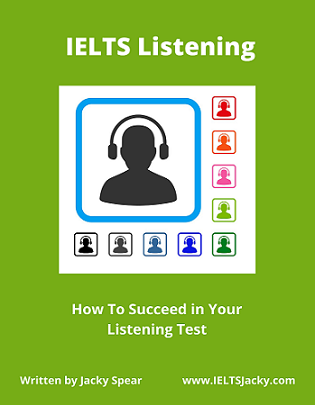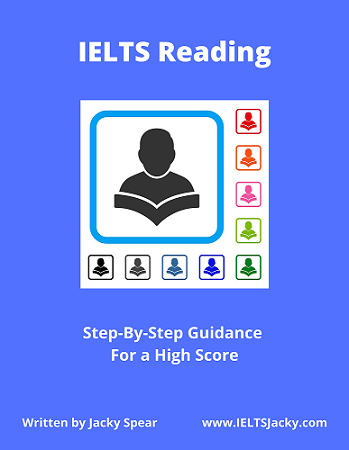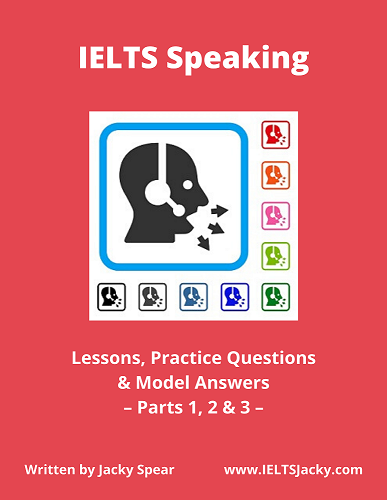The 10 Types of
IELTS Listening Questions
There are 10 different types of IELTS Listening questions that you could get in your test. These are:
Click the links to see a lesson on each type.
Your test will include around 5 of these so you need to know how to answer them all. Many of them could appear in any of the 4 sections of the test.
In this lesson, I’m going to give you an overview and an example of each type. I show you how to answer most of these sample questions in the individual step-by-step lessons listed above.
1) Matching
Matching questions are especially common in Section 1 where
you're required to listen for detail in a conversation between two people.
You will have to match the items in two lists of options. In the sample question below, for example, you must match the hotels (A – E) with the descriptions (1 – 4).
Types of IELTS listening questions: 1 – Matching
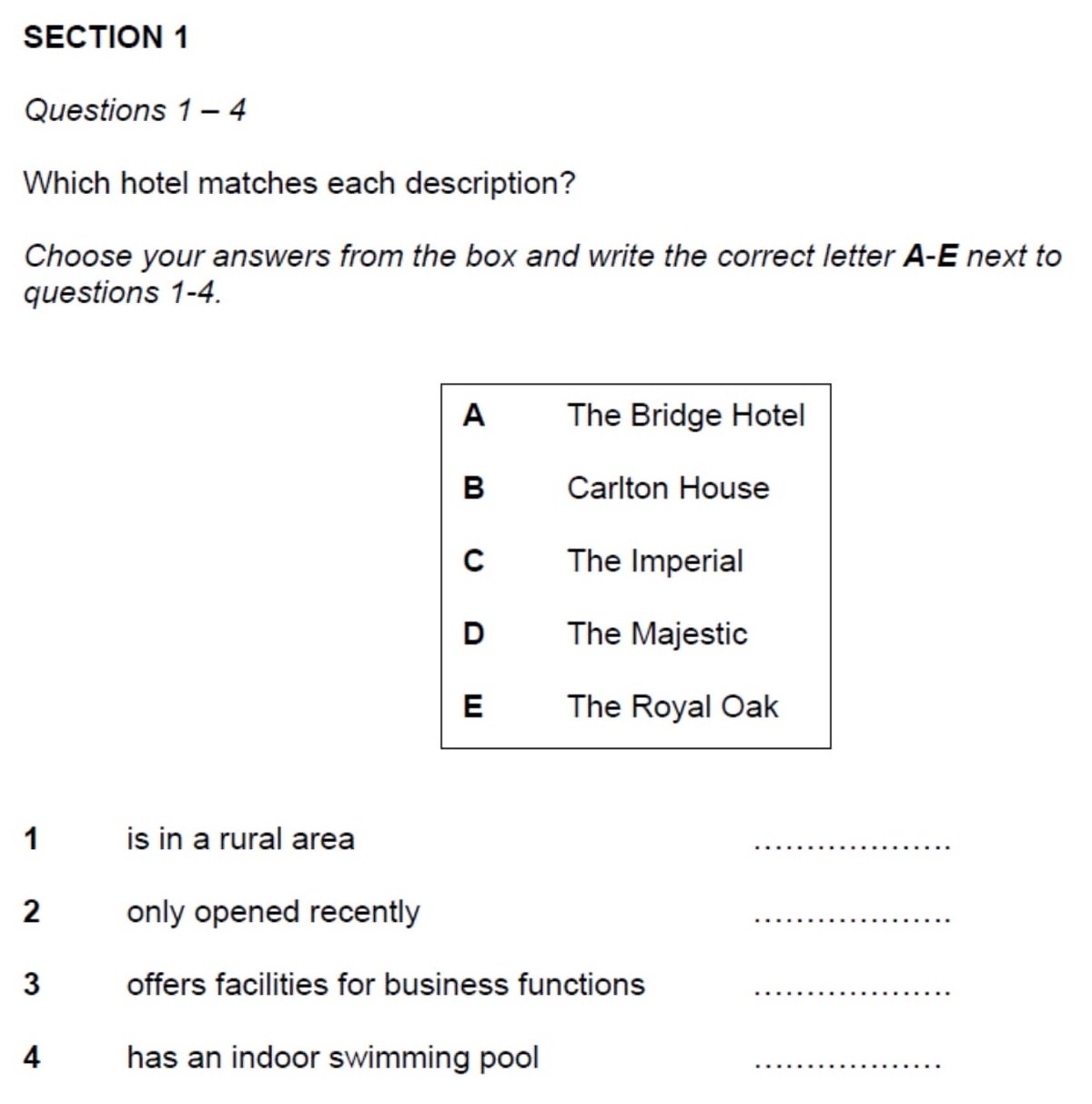
Source: Official website www.ieltsessentials.com
Expect synonyms and paraphrasing to be used. For example, in the recording, the speaker might say that the hotel is ‘located in the countryside or ‘away from the town’ rather than ‘is in a rural area’.
2) Multiple Choice
In multiple choice questions, you are required to choose the
correct answer from a shortlist (usually 3 words or phrases). Often the
answers will look similar in meaning so you will need to listen very carefully.
Don’t just select the first answer you hear.
In this sample test, the answers to questions 26 to 30 are either option A, B or C.
Types of IELTS listening questions: 2 – Multiple Choice
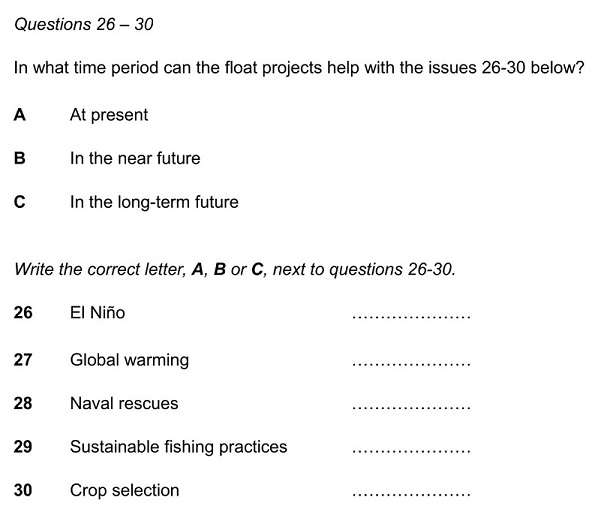
Source: Official website www.ieltsessentials.com
Synonyms and paraphrasing will be used in the recording. For example, the speaker might say ’soon’ rather than ‘in the near future’ for answer B.
3) Sentence Completion
This is a gap fill type
question. You must listen to the recording and fill in the missing words in the
sentences to complete them. You may have to add the ending to the sentences or
fill in words within the sentences.
Take careful note of how many words you are allowed to write and do not write more than this or your answer will be marked ‘incorrect’ even if the information you give is correct.
In this sample question, you have to complete four sentences using no more than two words for each answer.
Types of IELTS listening questions: 3 – Sentence Completion
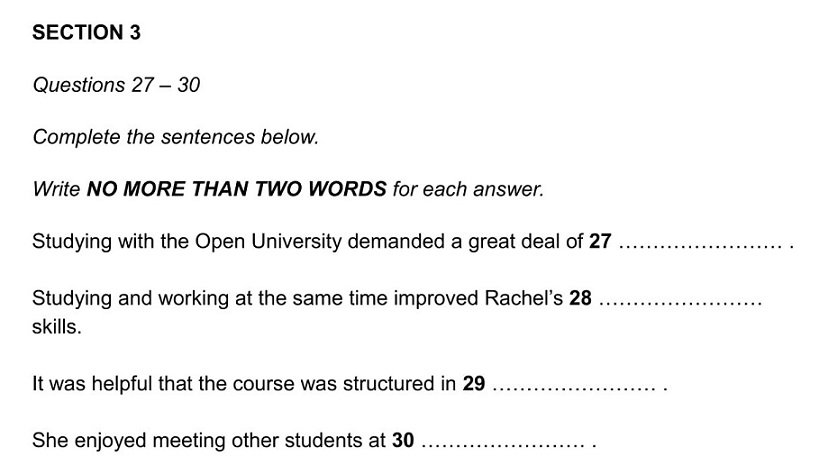
Source: Official website www.ieltsessentials.com
Don’t expect to hear the exact words written in the questions. The speaker will most likely paraphrase the information. For example, in question 28, the phrase ‘studying and working at the same time’ is replaced in the recording with ‘I had to fit time for studying round a full-time job’.
4) Form Completion
Form completion questions often come up in Section 1, which is a conversation between two people, but do appear in other sections too. The most common type is an application or an order form.
It's generally easy to predict what information you'll need to listen out for. In this sample question, for example, the answers will be a surname, a street name, a postcode, the type of item ordered and a number for how many items are ordered.
Types of IELTS listening questions: 4 – Form Completion
Name: Oliver 1 ……………….
Delivery address: 2 17
…………………. Street, Chester
postcode: 3 …………………….
Name of item ordered: 4 …………………
Number of items
ordered: 5 …………………
Watch out for distractors where information is given but then corrected or changed, for example,
“I’d like to order two, please. No, wait a minute. I’ll have three so that I can give one to my mum as well as my sister.”
5) Note Completion
This type of question can
take many different forms. It will be a gap fill activity of some sort where
you have to fill in the missing words. This could, for example, be missing
words in a set of notes from a lecture.
Pay careful attention to the number of words or numbers you are allowed to write for the answer.
The recording for this sample question is a radio broadcast about The National Arts Centre. You are required to fill in 6 pieces of missing information about the centre.
Types of IELTS listening questions: 5 – Note Completion
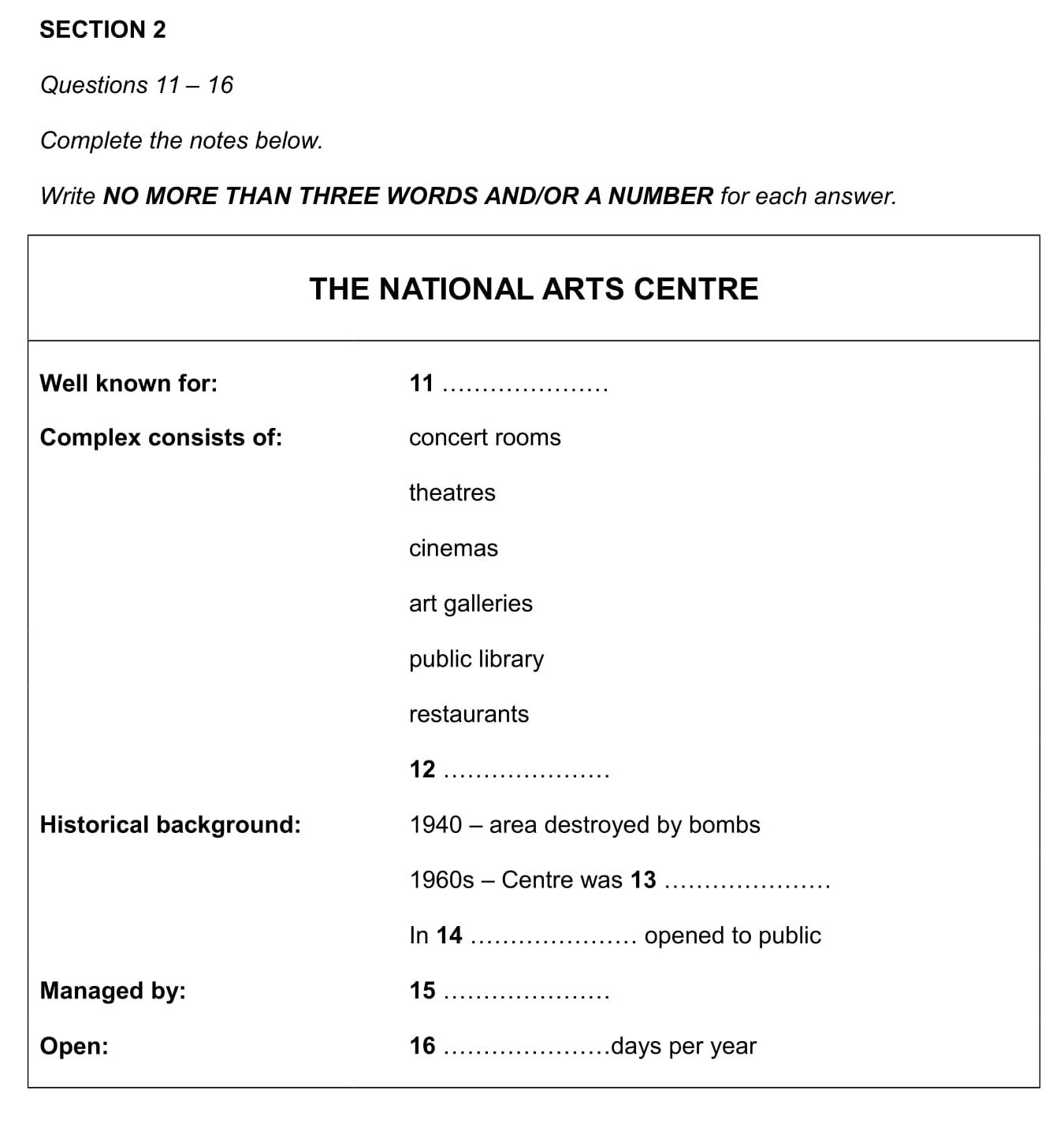
Source: Official website www.ieltsessentials.com
6) Table Completion
Table completion questions also require you to fill in missing information. The table will be made up of columns and rows containing information.
Tables generally categorise information, that is, they group pieces of information that are related in some way or share the same features.
This sample question follows on from the notes completion question we’ve just looked at and is also about The National Arts Centre. There are 4 pieces of missing information that need to be filled in.
Types of IELTS listening questions: 6 – Table Completion
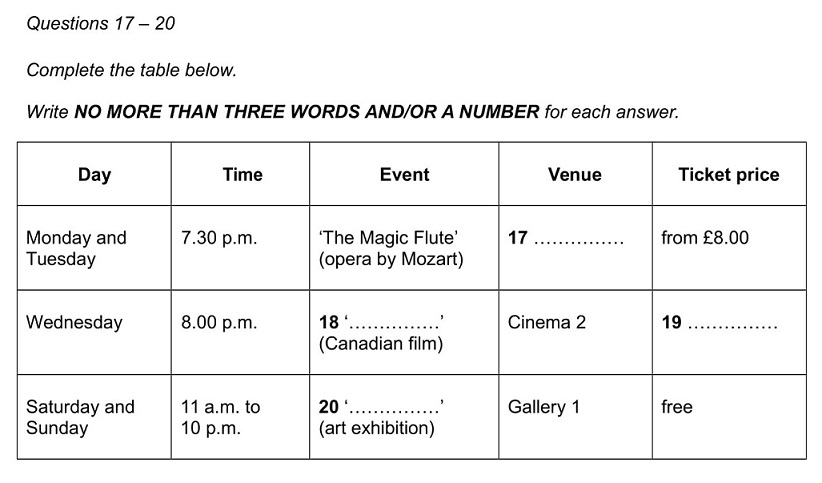
Source: Official website www.ieltsessentials.com
7) Summary Completion
The Listening test gets more
difficult as you progress through it and summary completion questions often come
up in Section 4, the most challenging part of the test.
You will be given a summary of the recording, typically a monologue on an academic subject such as a lecture on wildlife. There will be words missing from the summary which you must fill in. Expect synonyms and paraphrasing to be used extensively.
This sample question is a summary of a lecture on the Caveman Diet with 5 pieces of information missing.
Types of IELTS listening questions: 7 – Summary Completion

Source: Official website www.ielts.org
8) Short Answer Questions
This is another type of
question where you must identify specific information about a topic.
It’s particularly common in Section 2 which will be a monologue set in an everyday social context, for example, a welcome talk for new college students.
You must listen to the recording and write a short answer in each blank space provided. Sometimes, more than one answer will be required, for example, “What are the TWO major concerns new students have regarding accommodation?”
The recording for this sample question is an extract from a talk given to a group who are going to visit the UK. There are three questions with two answers required for each one.
Types of IELTS listening questions: 8 – Short Answer
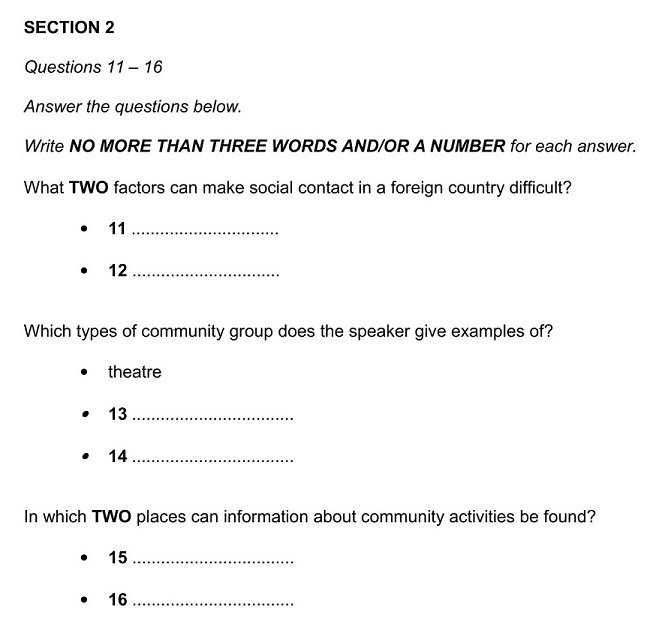
Source: Official website www.ieltsessentials.com
9) Plan / Map / Diagram Labelling
For this type of question, you’ll be given a plan of a building, a map of a specific location or a diagram of something and must fill in the missing labels.
Many students find these one of the easiest question types to answer because the graphic will contain lots of clues as to the missing words, especially in the labels already present.
As well as the plan, map or diagram, you may also be given a list of words from which to choose the correct answers. This is the case in the sample plan below. In this question, the speaker is the librarian of a new town library talking to a group of people who are visiting the library.
Types of IELTS listening questions: 9 – Plan Labelling
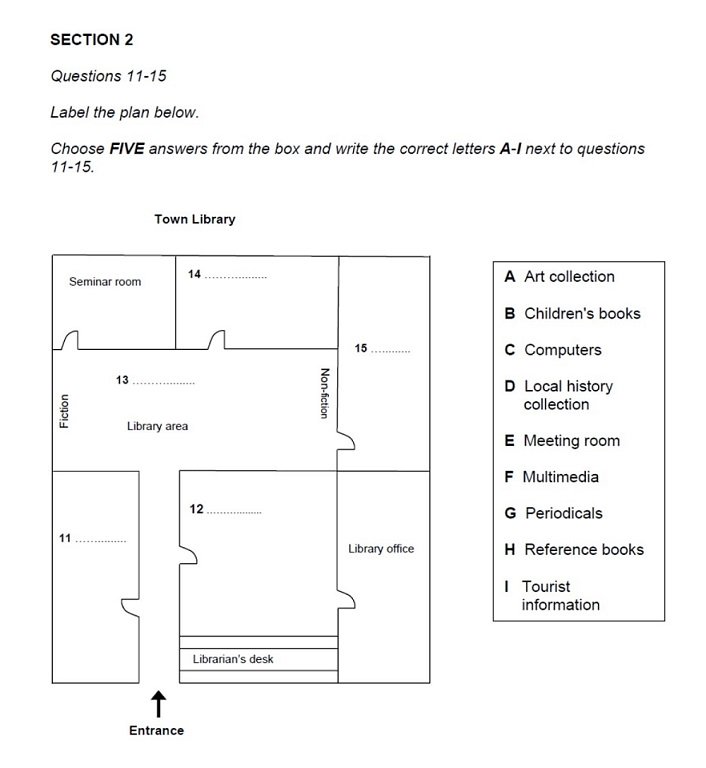
Source: Official website www.ieltsessentials.com
Here’s an example of a typical diagram question. The recording for this question is a seminar given by a climate scientist on ocean research. There are three pieces of missing information to be filled in on the diagram.
Types of IELTS listening questions: 9 – Diagram Labelling
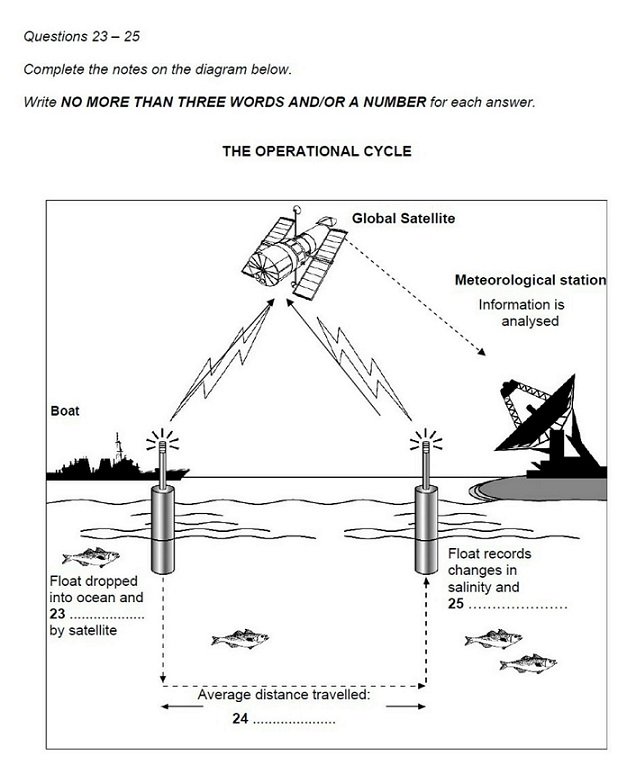
Source: Official website www.ieltsessentials.com
10) Flowchart
Completion
A flowchart shows the steps of a process. The process will have a start and an end with several steps in between.
It could be about almost anything that can be broken down into stages, for example, the outline of a lecture or essay, an application process, the stages of a training course or a short manufacturing process.
The graphic in this sample question shows the 3 stages of a project to design a water treatment system. It’s a Section 3 question so the recording will be a conversation between up to four people set in an educational or training context. In this case, the conversation is between a peer tutor and an engineering student who needs help with their project.
Types of IELTS listening questions: 10 – Flowchart Completion
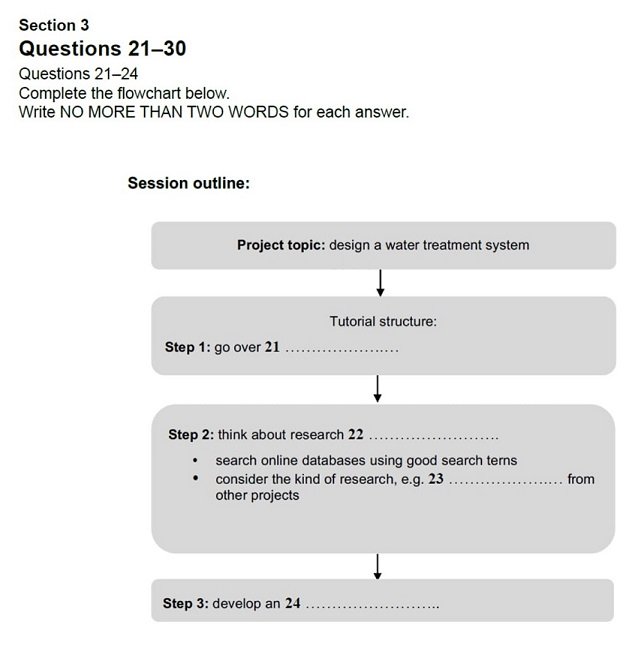
Source: Official website
www.ielts.org
Want to watch & listen to this lesson?
Click on this video.
Like this page?
IELTS Listening – All Lessons
IELTS Listening Test – Understand the format & question types. Know what skills are assessed. Also, discover 3 important marking tips.
Listening Strategies – Learn 3 essential listening strategies – question analysis, answer prediction & how to use keyword clues.
Listening Skills – Learn the 4 key listening skills needed for a high score highly. Examples from real questions.
Listening Exercises – 8 listening exercises to help you recognise & learn vocabulary for 6 common topics – time, numbers, prices, dates, letter names & addresses.
The 10 Question Types – Examples of all 10 types of Listening questions. Learn how to recognise & understand them. Links to 10 step-by-step lessons.
Listening Tips – Top 10 tips to bring you success in your Listening test. Essential information you need to know to achieve a high score.
How to Improve Your Listening Skills – 6 simple strategies essential for achieving a high score in the test.
Listening Practice – 4 practice techniques to develop your listening skills
Map & Plan Vocabulary – Learn the vocabulary you need for your test. 5 maps & plans with sample sentences containing common vocabulary of location & direction.
Listening Practice Samples – Short activities to improve your listening skills & help you learn topic vocabulary.
Genuine Full Practice Tests:
The 10 Question Types
Click the links below to learn how to answer each type of question.



